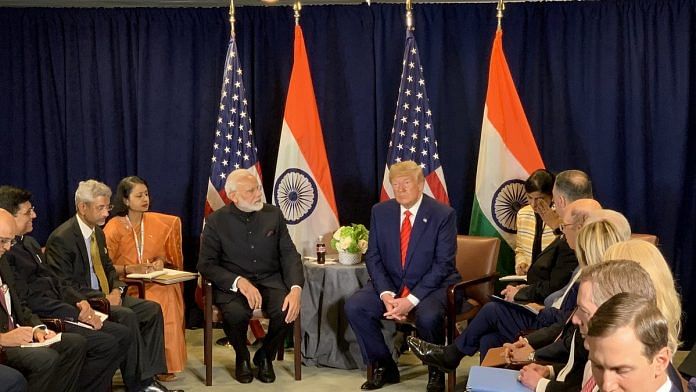New York: Prime Minister Narendra Modi has called for ending the politicisation of mechanisms created for combating terror, such as UN listings and the Financial Action Task Force (FATF), and stressed the need to accord the same level of urgency to fighting terrorism as to climate change.
Modi told a leaders’ dialogue on responses to terror and violent extremism on the margins of the UN General Assembly on Monday that terrorists shouldn’t be allowed to get funds and arms, according to secretary (west) A Gitesh Sarma of the external affairs ministry.
In an apparent reference to recent actions by China and Pakistan, Modi also said the world community needs “to avoid the politicisation of mechanisms like UN listings and FATF” that need to be enforced, Sarma told reporters.
A terror attack anywhere in the world “should be considered terrorism — not good or bad terrorism” and “not more or less”, Modi told the meeting. There should be “qualitative upgradation” in ongoing cooperation and intelligence-sharing through bilateral and regional frameworks, he added.
Also read: Trump’s Kashmir remarks don’t signal US policy, he’s playing India & Pakistan: Diplomats
China and Pakistan worked together to prevent the UN Security Council from listing Pakistan-based Jaish-e-Mohammed chief Masood Azhar as a global terrorist for years until earlier this year, when they were steamrolled by the US, France and the UK in the aftermath of the February 14 Pulwama attack.
Pakistan has sought to tarnish the audit of its systems to prevent money laundering and terror funding by the Financial Action Task Force (FATF) with the prospect of being blacklisted, a punitive measure that can impede its international borrowing capability. The Paris-based watchdog, currently headed by China, is expected to decide on the blacklisting in October.
According to Sarma, Modi also told the meeting that democratic values, diversity and inclusive development are the most important weapons against ideologies that promote terrorism and extremism. Modi called for global solidarity and readiness against terrorism just as the world has shown unity on challenges such as climate change.
The meeting took stock of the Christchurch Call to Action to eliminate terrorists and violent extremist content online.India has backed the call.
Counter-terrorism also figured in many of the bilateral meetings Modi and external affairs minister S Jaishankar had with counterparts on Monday, officials said. The situation in Kashmir came up at some meetings in the context of counterterrorism but the focus was on bilateral issues.
Modi held bilateral meetings with several world leaders, including German Chancellor Angela Merkel, Italian Prime Minister Giuseppe Conte, Namibian President Hage Geingob, Maldives President Ibrahim Solih, Qatar’s emir Sheikh Tamim bin Hamad al Thani, Niger President Mahamadou Issoufou and UNICEF executive director Henrietta Fore.
He also met Bhutan Prime Minister Lotay Tshering and Netherlands Prime Minister Mark Rutte. Briefing reporters about these engagements, external affairs ministry spokesperson Raveesh Kumar said the situation in Jammu and Kashmir came up in some meetings.
“You are aware that on the situation in Jammu and Kashmir, we have engaged with several countries at different levels. But you know, given the nature of the meetings…the focus was on bilateral issues,” Kumar said.
The emir of Qatar expressed his gratitude to the Indian diaspora for its role in supporting his country’s economy. The two sides discussed counterterrorism cooperation against the backdrop of the situation in the region, Kumar said.
India has granted $35 million for building the Mahatma Gandhi International Convention Center in Niger, which is nearing completion. The Niger president raised the issue of cooperation in agriculture and solar energy.
With Italy, the focus was on defence, economic cooperation and expanding bilateral investments. During the meeting with Maldives President Solih, there was a discussion on cooperation in cricket and climate change. “There is a proposal for training Maldivian cricketers in India and the training is going to start in October,” Kumar said.
Jaishankar had bilateral meetings with his counterparts from Iran, Turkey, the Netherlands, Uzbekistan, Tajikistan and the United Arab Emirates. He also met the US special envoy on Afghanistan, Zalmay Khalilzad.
Also read: Modi will always have Houston & India, a changed relationship with the US
By special arrangement with ![]()



